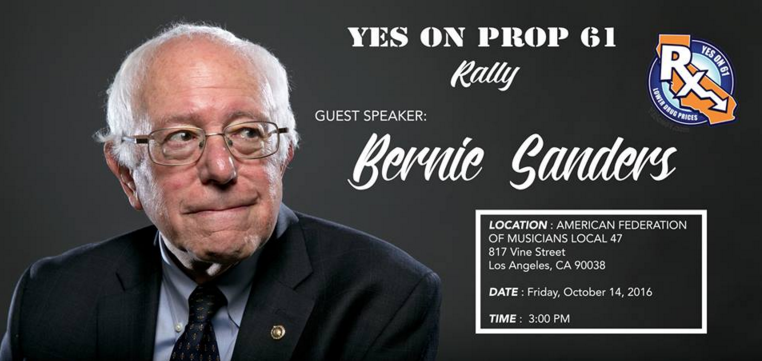In the War of We, The People against Big Pharma, California has become a major battleground. Lobbyists in the state capitol of Sacramento have been pulling out all the stops. The industry has poured $109 million into defeating the ballot measure – more than any industry has ever raised against any such measure in the Golden State’s history. By way of comparison, the amount of money spent to fight the U.K.’s exit from the European Union was the equivalent of approximately $40 million in U.S. dollars.
Despite its best efforts, however, Big Pharma is poised to lose this election day, and they’re running scared. If California Proposition 61 passes, as seems likely, it will have a tremendous impact on similar ballot measures in other states. Progressive champion Senator Bernie Sanders, who has been in California leading the fight to pass Proposition 61, said in an editorial appearing in the Sacramento Bee:
“I’m finding much reason for hope. I am encouraged to believe voters will embrace Prop. 61 on Tuesday and send a powerful signal across the nation that the days of unchecked drug company greed are numbered.”
Proposition 61 would force pharmaceutical companies to offer the same discounts to state health care agencies as they give to the Department of Veterans Affairs – which are mandated by federal law. But even if Proposition 61 passes, don’t expect Big Pharma to concede without a fight. Already, the pharmaceutical industry, which has literally been “carpet-bombing” California airwaves with ads against Proposition 61, is claiming that the new law would lead to higher drug prices and discourage innovation – the same tired, old arguments that we’ve been hearing for years. They’re also claiming that if they are forced to offer discounted prices on medications to the general public, they may no longer be able to offer them to the V.A.
Not surprisingly, state GOP leaders are dead-set against the measure. However, the Democrats, which are firmly in control of the governor’s office as well as the legislature, has remained silent on the issue – or has sided with Big Pharma. This is also the case with California’s major newspapers, all of which have been claiming that Proposition 61 is “poorly constructed” and vague.
Pharmaceutical industry apologist Kathy Fairbanks, a spokesperson for the “No on 61” campaign, has acknowledged that the recent steep price hikes on many prescription drugs has made it much more difficult to fight the measure. Like others across the country, California citizens are fed up with a greedy, corrupt industry that feeds on disease and human misery.
However, Big Pharma has seemingly inexhaustible financial resources. Speaking to the media, Ms. Fairbanks promised that if Proposition 61 passes, the industry will make certain that it “will be tied up in litigation for years” – legal and court costs be damned (which, like fines, penalties and judgments, are simply part of doing business for these vampires).
One thing is certain: win, lose or draw, the impact of Proposition 61 will spread far beyond the California state line. If there is any institution more hated by Americans than Wall Street, it’s Big Pharma. This is just the opening battle in war for the right to affordable, universal health care that may wind up being fought for years to come.

